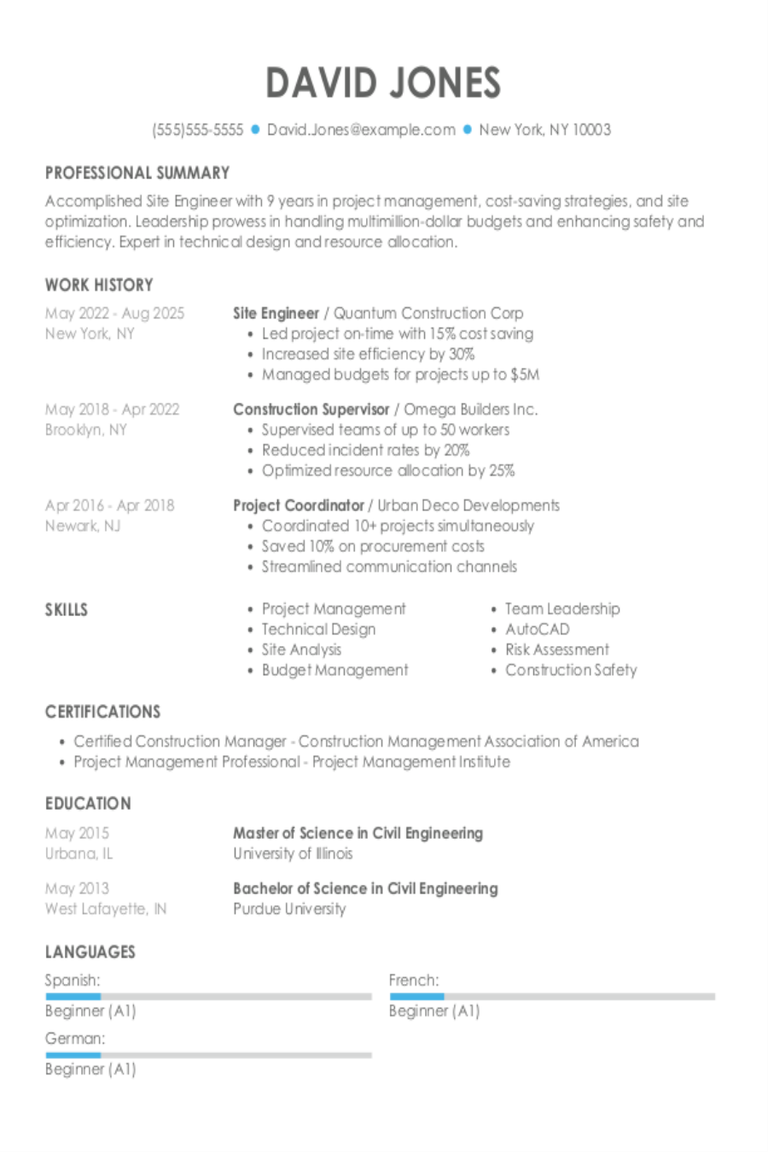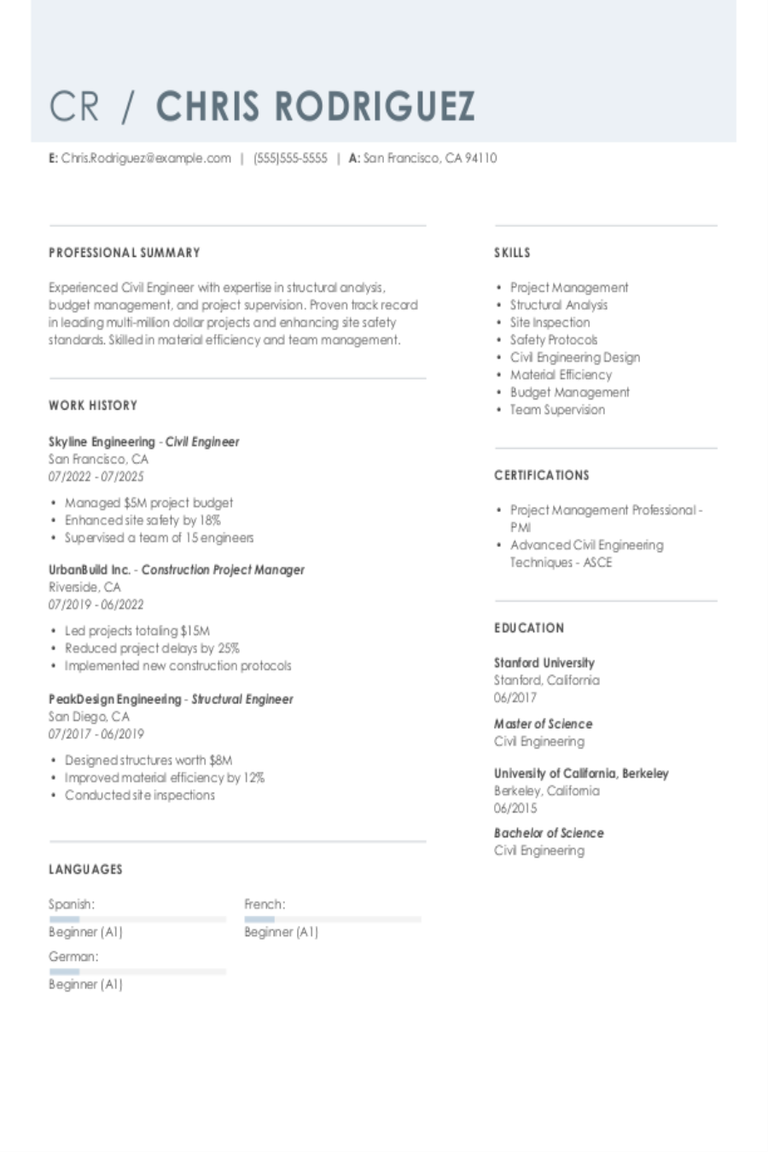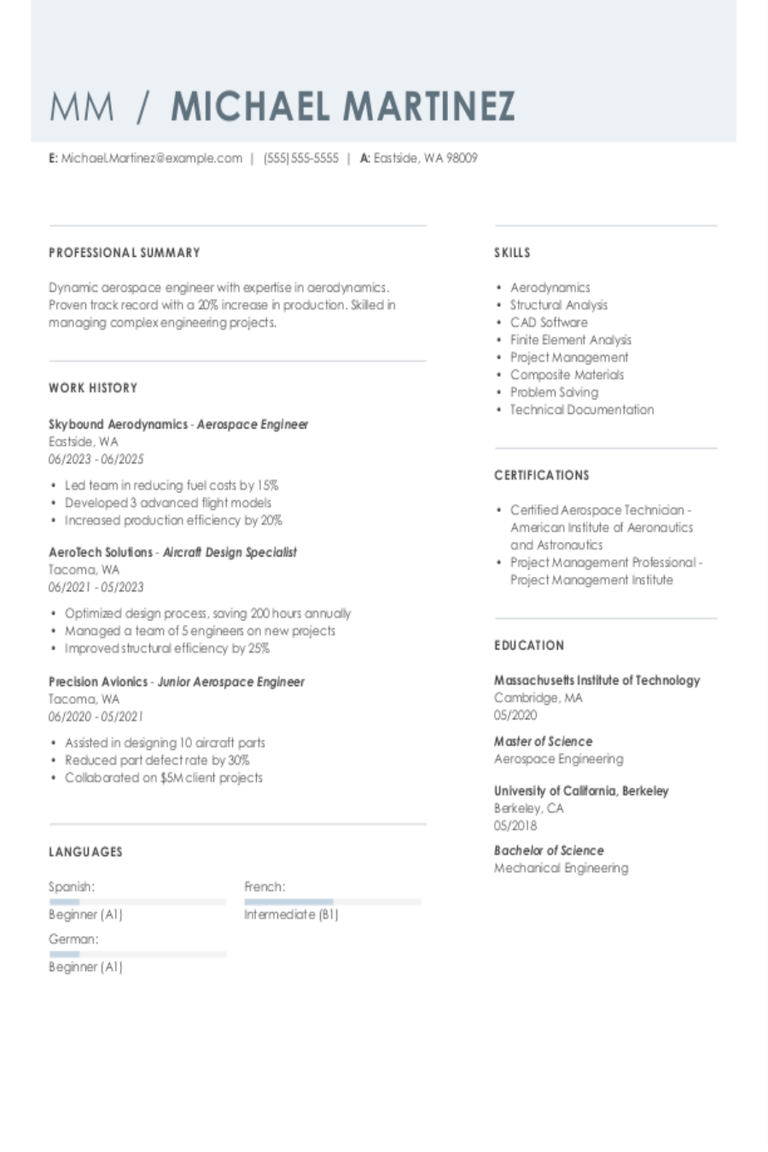Table of Contents
Get started with MyPerfectResume today!
- Build a resume on any device
- Pick an ATS-friendly template
- Tailor with AI copy suggestions
Why this resume works
- Quantifies accomplishments: Measurable accomplishments, such as managing projects that cut costs by 15% and leading site safety improvements, highlight the applicant’s impact and value.
- Showcases career progression: Starting as an assistant construction manager and advancing to a civil site engineer shows a clear path of career growth marked by increased responsibilities.
- Uses action-oriented language: Using strong action verbs like “managed,” “supervised,” and “implemented” conveys initiative and effectiveness.
More Civil Site Engineer Resume Examples
Our civil site engineer resume examples show how to feature your project management skills, technical expertise, and on-site experience. Use these samples to build a civil engineering resume that showcases your strengths and positions you as a key player in construction projects.
Entry-Level Civil Site Engineer
Why this resume works
- Centers on academic background: Emphasizing a master’s in civil engineering from Texas A&M University solidifies the applicant’s foundation for early-career opportunities.
- Effective use of keywords: Using industry-specific keywords like project management and site planning, the applicant optimizes their resume to pass applicant tracking systems (ATS) and stand out to hiring managers.
- Shows digital literacy: By mentioning AutoCAD expertise, the applicant showcases essential computer skills needed for today’s tech-driven construction industry.
Mid-Level Civil Site Engineer
Why this resume works
- Points to measurable outcomes: Quantifiable results, like cutting delays by 40% and boosting team efficiency by 25%, highlight a proactive approach to optimizing project timelines and resource management.
- Displays technical expertise: Expertise in tools like AutoCAD and certifications such as LEED Green Associate reflect a strong command of industry-specific software and sustainable construction practices.
- Demonstrates language abilities: Language skills in Spanish, French, and German enable communication in diverse teams and across international projects.
Experienced Civil Site Engineer
Why this resume works
- Showcases impressive accomplishments: By highlighting standout achievements like managing $10 million budgets and reducing delays, the applicant reflects senior-level performance and significant business impact.
- Focuses on work history: Using a chronological resume format, detailing roles from junior engineer to civil site engineer, effectively emphasizes extensive career experience.
- Lists relevant certifications: Listing certifications such as Professional Engineer and Certified Construction Manager on the resume reinforces the applicant’s dedication to continuous learning.
Civil Site Engineer Resume Template (Text Version)
Emma Chen
Chicago, IL 60603
(555)555-5555
Emma.Chen@example.com
Professional Summary
Certified Civil Site Engineer with 6 years of experience in project management and site safety analysis. Proven track record of improving efficiency and reducing costs. Skilled in AutoCAD, Resource Allocation, and Regulatory Compliance.
Work History
Civil Site Engineer
Infrastructure Developments Inc. – Chicago, IL
June 2023 – September 2025
- Managed projects reducing costs by 15%
- Supervised 5+ site assessments weekly
- Led site safety improvements by 30%
Field Project Coordinator
Urban Constructors LLC – Chicago, IL
June 2019 – May 2023
- Coordinated schedules for 10+ contractors
- Increased project efficiency by 25%
- Implemented tools cutting delays by 12%
Assistant Construction Manager
Riverside Building Solutions – Springfield, IL
September 2017 – May 2019
- Oversaw budgets under $2 million
- Enhanced resource allocation by 20%
- Facilitated site audits to ensure compliance
Skills
- Project Management
- Site Safety Analysis
- Resource Allocation
- Budget Management
- AutoCAD Proficiency
- Structural Analysis
- Risk Assessment
- Regulatory Compliance
Certifications
- Certified Civil Engineer – National Society of Professional Engineers
- OSHA Safety Certification – Occupational Safety and Health Administration
Education
Master of Science Civil Engineering
University of Southern California Los Angeles, California
May 2017
Bachelor of Science Civil Engineering
University of California, Berkeley Berkeley, California
May 2015
Languages
- Spanish – Beginner (A1)
- French – Beginner (A1)
- German – Beginner (A1)
Related Resume Guides
Advice for Writing Your Civil Site Engineer Resume
Explore our advice section on how to write a resume specifically for civil site engineers. Discover how to highlight your engineering skills and field experience in a way that stands out to potential employers. Whether you’re managing construction projects or ensuring safety standards, we’ll help you craft a resume that showcases your strengths and achievements in the best light.
Highlight relevant technical skills
As a civil site engineer, technical skills enable effective planning, designing, and overseeing of construction projects. Including a dedicated skills section on your resume lets employers quickly assess your abilities.
Commonly sought-after technical skills for civil site engineers include skills in AutoCAD, Civil 3D, and other design software. Knowledge of construction methods and materials is also essential. Additionally, understanding surveying techniques and tools plays a significant role in accurate project planning.
Familiarity with project management software like MS Project or Primavera can ensure that projects remain on track. You can also incorporate these skills into your work experience by highlighting their application in past projects. This approach highlights not only what you know but also how you’ve applied these abilities to tackle real-world tasks and challenges effectively.
Example of a technical skills section
- CAD software (AutoCAD, Civil 3D)
- Construction management software (Primavera P6, MS Project)
- Geographic information system (GIS) tools
- Soil and materials testing methods
- Surveying instruments (total station, GPS)
- Structural analysis techniques
- Hydrology and drainage design principles
- Roadway design standards and specifications
- Environmental impact assessment procedures
You can use our Resume Builder to craft a resume that highlights technical skills in addition to key soft skills like problem-solving, communication, and leadership.
Quantify your accomplishments
Quantifying your accomplishments as a civil site engineer makes your resume stand out by showing exactly what you have achieved. Instead of just listing what you were responsible for, talk about how your work made a difference.
For example, mention how much money you saved on a project, or how quickly you completed a task compared to the usual time. Using numbers and percentages helps hiring managers see the real impact of your work right away.
In the work experience section, include your job title, employer name, location, and employment dates for each entry. Then, turn duties into achievements by adding measurable results like cost reductions or efficiency improvements. Use action verbs to start each bullet point to show that you’re results-driven.
This approach not only highlights your skills but also helps hiring managers understand your strengths at a glance. When you quantify accomplishments, it paints a clear picture of what you can do as a civil site engineer. It shows that you’re not just doing tasks but improving processes and achieving goals. This kind of detail helps potential employers quickly assess if you’re the right fit for their team.
5 civil site engineer work history bullet points
- Supervised daily construction activities across 5 project sites, ensuring adherence to timelines and reducing delays by 25%.
- Collaborated with architects and contractors to implement design revisions, cutting material costs by 10%.
- Managed quality control inspections for structural components, achieving a 98% compliance rate with safety standards.
- Prepared detailed site reports and progress updates for stakeholders, improving project transparency and communication efficiency by 20%.
- Coordinated logistics for equipment and materials delivery, minimizing downtime and saving $15K in operational expenses.
Not sure how to start your resume? Explore our professional resume examples to spark ideas and build a layout that stands out.
Write a powerful professional summary
A professional summary on a resume serves as an introduction for hiring managers, providing a snapshot of your skills and accomplishments. You can decide whether to use a summary or a resume objective based on your experience level and career goals.
A professional summary is a brief statement that highlights your experience, skills, and achievements. It’s best suited for those with some work experience under their belt. Its main purpose is to showcase your professional identity and the value you offer to potential employers.
In contrast, a resume objective is more about stating career goals and is ideal for entry-level applicants, people changing careers, or those with employment gaps. While a summary talks about past achievements, an objective focuses on “what I aim to contribute.”
Now that we’ve covered these basics, let’s dive into examples of both summaries and objectives tailored for various industries and levels of experience.
Civil site engineer resume summary examples
Entry-level
Recent civil engineering graduate with a Bachelor of Science in Civil Engineering from an ABET-accredited program. Equipped with foundational knowledge in site design, surveying, and project management. Completed internships focusing on infrastructure projects and familiar with AutoCAD and Civil 3D software. Eager to apply skills in a dynamic engineering team.
Mid-career
Results-driven civil site engineer with over six years of experience in managing residential and commercial construction projects. Proficient in overseeing site investigations, preparing technical specifications, and coordinating with contractors to ensure compliance with design standards. Recognized for delivering projects within budget and timelines while maintaining high safety standards.
Experienced
Seasoned civil site engineer with more than 15 years of expertise in large-scale urban development projects. Specializes in sustainable infrastructure solutions and advanced geotechnical analysis. Proven track record of leading multidisciplinary teams to successful project completion, optimizing resource allocation, and significantly reducing environmental impact. Committed to innovative engineering practices and continuous improvement.
Civil site engineer resume objective examples
Entry-level
Detail-oriented civil engineering graduate with a focus on site development and infrastructure projects. Seeking an entry-level civil site engineer position to apply academic knowledge and technical skills in a collaborative environment, contributing to the successful planning and execution of construction projects.
Career changer
Resourceful professional transitioning into civil engineering, bringing strong project management experience and a passion for sustainable infrastructure solutions. Eager to support engineering teams by leveraging analytical skills and problem-solving abilities in a civil site engineer role focused on environmental impact reduction.
Recent graduate
Recent civil engineering graduate eager to start a career as a civil site engineer. Equipped with hands-on experience from internship placements and coursework in structural analysis and geotechnical engineering, dedicated to delivering high-quality results in fast-paced construction environments.
Choose a resume template that is simple and professional, featuring clear section headings and easy-to-read fonts. Keep design elements minimal to highlight your skills and experience.
Showcase your credentials
Listing certifications, licenses, and specialized training is especially important for a civil site engineer because it shows you have the technical knowledge required to handle complex projects. These credentials demonstrate your ability to meet industry standards and build trust with employers.
A dedicated certifications section helps your resume stand out and complements your educational background by showing practical skills. Here are a few examples of relevant certifications for your resume:
- Certified Civil Engineer (CCE)
- Construction Quality Management Certification
- OSHA 30-Hour Construction Safety Certification
- AutoCAD Professional Certification
- Project Management Professional (PMP)
Having certifications relevant to civil engineering shows you are prepared for challenges like safety compliance, project management, or using advanced tools like AutoCAD. Highlighting these qualifications makes it clear you’re ready to excel in the role.
Example of a certifications section
Certified Professional Engineer (PE)
Issued by: National Society of Professional Engineers (NSPE)
Issued 2021
LEED Green Associate
Issued by: U.S. Green Building Council
Expires 2025
Project Management Professional (PMP)
Issued by: Project Management Institute (PMI)
Issued 2022
OSHA 30-Hour Construction Safety and Health
Issued by: Occupational Safety and Health Administration (OSHA)
Issued 2023
AutoCAD Civil 3D Certified Professional
Issued by: Autodesk
Expires 2024
Use a professional resume format that aligns with your experience level to ensure your skills and qualifications stand out to hiring managers for engineering roles.
FAQ
Do I need to include a cover letter with my civil site engineer resume?
Including a cover letter with your civil site engineer resume can greatly improve your application and help you stand out to hiring managers.
A cover letter allows you to emphasize specific projects you’ve worked on, showcase your problem-solving skills, and convey why you’re passionate about civil engineering.
When a company emphasizes sustainability in their designs or has notable projects, mention experiences or interests that align with these goals.
Consider using our Cover Letter Generator to craft a personalized cover letter that complements your resume.
Additionally, reviewing cover letter examples can offer insights into industry-specific language and structure, aiding you in creating a compelling narrative that sets you apart.
How long should a civil site engineer’s resume be?
For a civil site engineer, determining how long a resume should be depends on your experience level. A one-page resume is effective for those with up to five years of experience, focusing on key skills such as project management, civil design skills, and site analysis.
If you have extensive experience or have managed significant projects, a two-page resume can better showcase your achievements and technical expertise.
It’s important to tailor the content so that each section highlights relevant engineering tasks and roles. Explore our guide on crafting the perfect length for your career stage for more insights into how long a resume should be.
How do you write a civil site engineer resume with no experience?
Crafting a resume with no experience for a civil site engineer role can be daunting. However, you can leave a strong impression by highlighting your education, skills, and any relevant projects you have undertaken. Here are a few tips to help you get started:
- Emphasize your education: Start by listing your degree in civil engineering, including the institution, graduation date, and any honors or relevant coursework that aligns with site engineering.
- Highlight academic projects: Detail any significant projects you completed during your studies. Explain your role, what you accomplished, and how it relates to civil site engineering tasks.
- Showcase applicable skills: Identify skills that are important for a civil site engineer, such as CAD software skills, analytical thinking, and problem-solving. If you’ve developed these through courses or independent learning, make sure to highlight them.
See our guide on writing a resume with no experience for more detailed advice on crafting a resume specifically tailored to entry-level civil site engineer positions.
Rate this article
Civil Site Engineer
Share this page
Additional Resources

Site Engineer Resume Examples & Templates
Check out these site engineer resume examples to show off your building skills and project experience. Learn how to highlight your work in construction and impress future employers.Build my resumeImport

Civil Engineering Resume Examples & Templates
Explore civil engineering resume examples to learn how to highlight your experience in designing projects, solving problems, and working with teams. These samples can help you showcase your skills in

Civil Engineer Resume Examples & Templates
Explore civil engineer resume examples and tips to learn how to highlight your project experience, design skills, and teamwork to stand out for engineering roles.Build my resumeImport existing resumeCustomize this

Civil Engineering Intern Resume Examples & Templates
Explore civil engineering intern resume examples to see how to highlight key projects, technical skills, and teamwork to stand out to employers.Build my resumeImport existing resumeCustomize this templateWhy this resume

Engineering CV Examples & Templates
Engineers play many roles in designing, building and improving infrastructures, technologies, medical equipment and more. Employment in this occupation is expected to grow 4% over the next decade, bringing in

Aerospace Engineer Resume Examples & Templates
Explore aerospace engineer resume examples that show you how to highlight your experience designing aircraft, testing systems, and solving technical problems.Build my resumeImport existing resumeCustomize this templateWhy this resume
